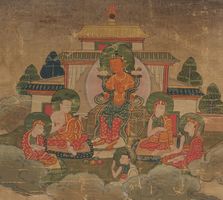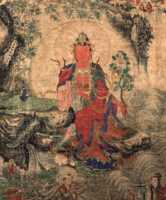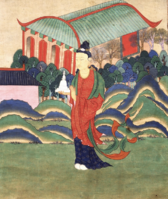Maitreya: Difference between revisions
No edit summary |
m (Text replacement - "{{Footer}}" to "") |
||
| (2 intermediate revisions by 2 users not shown) | |||
| Line 4: | Line 4: | ||
|MainNameTib=བྱམས་པ་ | |MainNameTib=བྱམས་པ་ | ||
|MainNameWylie=byams pa | |MainNameWylie=byams pa | ||
|bio=Known in Tibetan as the "Lord of Love" or the "Noble Loving One" འཕགས་པ་བྱམས་པ། (Pakpa Jampa), the "Loving Protector" བྱམས་པའི་མགོན་པོ་ (Jampay Gonpo), in Chinese as 弥勒佛 (Mi Le Fo), Japanese as Miroku, and commonly as Maitreya throughout Asia and beyond. Maitreya is the bodhisattva called the "future Buddha" who resides in Tushita heaven until coming to the human realm to take the role of the next Buddha after Śākyamuni Buddha. According to tradition, Asaṅga received teachings from Maitreya and recorded them in the Five Dharma Treatises of Maitreya, which form the basis for buddha-nature teachings and the larger Yogācāra teachings in general. | |bio=Known in Tibetan as the "Lord of Love" or the "Noble Loving One" {{TibIL|འཕགས་པ་བྱམས་པ།}} (Pakpa Jampa), the "Loving Protector" {{TibIL|བྱམས་པའི་མགོན་པོ་}} (Jampay Gonpo), in Chinese as 弥勒佛 (Mi Le Fo), Japanese as Miroku, and commonly as Maitreya throughout Asia and beyond. Maitreya is the bodhisattva called the "future Buddha" who resides in Tushita heaven until coming to the human realm to take the role of the next Buddha after Śākyamuni Buddha. According to tradition, Asaṅga received teachings from Maitreya and recorded them in the Five Dharma Treatises of Maitreya, which form the basis for buddha-nature teachings and the larger Yogācāra teachings in general. | ||
The list of five is: Ornament of Clear Realization (Abhisamayālaṃkāra, mngon rtogs rgyan, 現觀莊嚴論); Ornament for the Mahāyāna Sūtras (Mahāyānasūtrālaṃkāra, theg pa chen po mdo sde rgyan, 大乘莊嚴經論); Differentiation of the Middle and the Extremes (Madhyāntavibhāga, dbus mtha' rnam 'byed, 辨中邊論頌); Differentiation of Phenomena and Their Nature (Dharmadharmatāvibhāga, chos dang chos nyid rnam 'byed, 辨法法性論); and The Mahāyāna Treatise of the Highest Continuum (Ratnagotravibhāga Mahāyānottaratantraśāstra, theg pa chen po rgyud bla ma'i bstan bcos, 分別寶性大乘無上續論). | The list of five is: Ornament of Clear Realization (Abhisamayālaṃkāra, mngon rtogs rgyan, 現觀莊嚴論); Ornament for the Mahāyāna Sūtras (Mahāyānasūtrālaṃkāra, theg pa chen po mdo sde rgyan, 大乘莊嚴經論); Differentiation of the Middle and the Extremes (Madhyāntavibhāga, dbus mtha' rnam 'byed, 辨中邊論頌); Differentiation of Phenomena and Their Nature (Dharmadharmatāvibhāga, chos dang chos nyid rnam 'byed, 辨法法性論); and The Mahāyāna Treatise of the Highest Continuum (Ratnagotravibhāga Mahāyānottaratantraśāstra, theg pa chen po rgyud bla ma'i bstan bcos, 分別寶性大乘無上續論). | ||
| Line 15: | Line 15: | ||
|BdrcPnum=6118 | |BdrcPnum=6118 | ||
|HarLink=https://www.himalayanart.org/pages/maitreya/index.html | |HarLink=https://www.himalayanart.org/pages/maitreya/index.html | ||
|DeityAppearance=Peaceful | |||
|DeityGender=Male | |||
|DeityGroup=nye ba'i sras chen brgyad | |||
|HasDrlPage=Yes | |HasDrlPage=Yes | ||
|HasLibPage=Yes | |HasLibPage=Yes | ||
| Line 42: | Line 45: | ||
|IsInGyatsa=No | |IsInGyatsa=No | ||
}} | }} | ||
<noinclude>[[Category:Indian authors sanskrit names]]</noinclude> | |||
Latest revision as of 14:39, 5 June 2024
| MainNamePhon | Maitreya |
|---|---|
| MainNameTib | བྱམས་པ་ |
| MainNameWylie | byams pa |
| MainNameDev | मैत्रेय |
| MainNameSkt | Maitreya |
| SortName | Maitreya |
| AltNamesTib | འཕགས་པ་བྱམས་པ་ · བྱམས་པའི་མགོན་པོ་ · མགོན་པོ་བྱམས་པ་ · མ་ཕམ་པ་ |
| AltNamesWylie | 'phags pa byams pa · byams pa'i mgon po · mgon po byams pa · ma pham pa |
| AltNamesOther | Ajita |
| bio | Known in Tibetan as the "Lord of Love" or the "Noble Loving One" འཕགས་པ་བྱམས་པ། (Pakpa Jampa), the "Loving Protector" བྱམས་པའི་མགོན་པོ་ (Jampay Gonpo), in Chinese as 弥勒佛 (Mi Le Fo), Japanese as Miroku, and commonly as Maitreya throughout Asia and beyond. Maitreya is the bodhisattva called the "future Buddha" who resides in Tushita heaven until coming to the human realm to take the role of the next Buddha after Śākyamuni Buddha. According to tradition, Asaṅga received teachings from Maitreya and recorded them in the Five Dharma Treatises of Maitreya, which form the basis for buddha-nature teachings and the larger Yogācāra teachings in general.
The list of five is: Ornament of Clear Realization (Abhisamayālaṃkāra, mngon rtogs rgyan, 現觀莊嚴論); Ornament for the Mahāyāna Sūtras (Mahāyānasūtrālaṃkāra, theg pa chen po mdo sde rgyan, 大乘莊嚴經論); Differentiation of the Middle and the Extremes (Madhyāntavibhāga, dbus mtha' rnam 'byed, 辨中邊論頌); Differentiation of Phenomena and Their Nature (Dharmadharmatāvibhāga, chos dang chos nyid rnam 'byed, 辨法法性論); and The Mahāyāna Treatise of the Highest Continuum (Ratnagotravibhāga Mahāyānottaratantraśāstra, theg pa chen po rgyud bla ma'i bstan bcos, 分別寶性大乘無上續論). |
| BiographicalInfo | Maitreya is often called the future Buddha and is the bodhisattva who resides in Tushita heaven until coming to the human realm to take the role of the next Buddha after Shakyamuni Buddha. |
| TeacherOf | Asaṅga |
| BDRC | http://tbrc.org/link?RID=P6118 |
| Himalayan Art Resources | https://www.himalayanart.org/pages/maitreya/index.html |
| IsInGyatsa | No |
| BnwShortPersonBio | Known in Tibetan as the "Lord of Love" or the "Noble Loving One" འཕགས་པ་བྱམས་པ། (Pakpa Jampa), the "Loving Protector" བྱམས་པའི་མགོན་པོ་ (Jampay Gonpo), in Chinese as 弥勒佛 (Mi Le Fo), Japanese as Miroku, and commonly as Maitreya throughout Asia and beyond. Maitreya is the bodhisattva called the "future Buddha" who resides in Tushita heaven until coming to the human realm to take the role of the next Buddha after Śākyamuni Buddha. According to tradition, Asaṅga received teachings from Maitreya and recorded them in the Five Dharma Treatises of Maitreya, which form the basis for buddha-nature teachings and the larger Yogācāra teachings in general. |
| PosBuNayDefProv | Definitive |
| PosAllBuddha | Yes |
| Other wikis |
If the page does not yet exist on the remote wiki, you can paste the tag |



